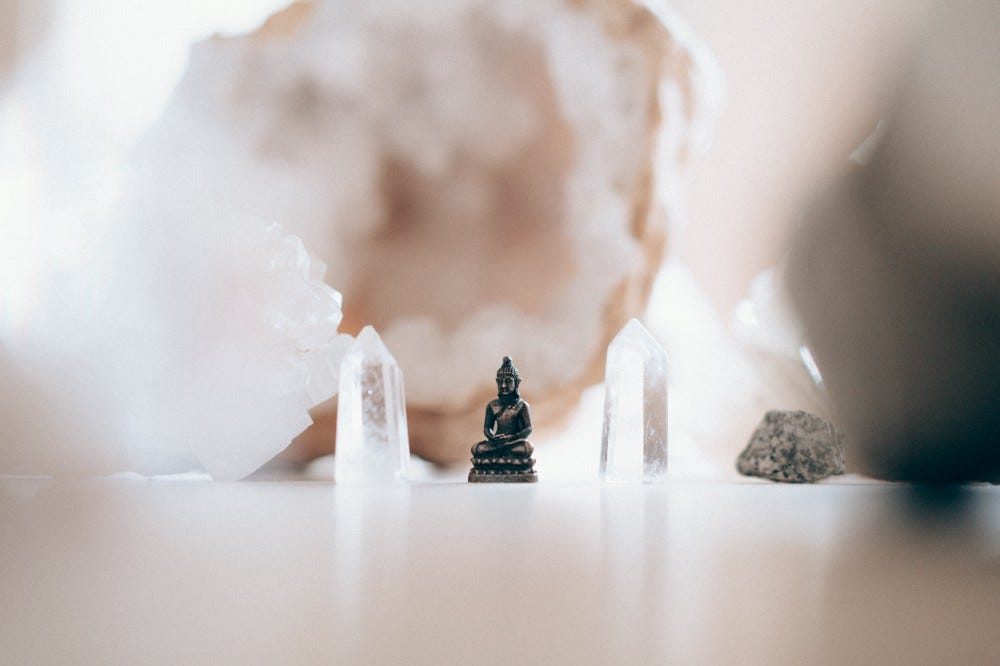Thousands of Westerners are swimming in a syncretic spiritual slurry. I know this because I used to be one of them.

Three years ago, my life had a lively and bucolic rhythm. At the time, I was attending business school at Stanford and living in a bathroom-less shack nestled in the woods of Menlo Park, California.
Most mornings, I would wake myself up with asana yoga practice before 6AM, then do some Vipassana meditation to set my mind for the day. I would pull a tarot card before I left my shack to see what kind of day it might be and burn some sage. My favorite class in business school was colloquially called "Touchy Feely", an intense introduction to emotional intelligence and interpersonal psychology that was the kind of science-backed pseudo-spirituality Silicon Valley loves.
Unbeknownst to me, I was one of many victims of the Information Age and globalization, armed with just enough spiritual knowledge to be dangerous—dangerous to myself and my own long term development, but thankfully only envy- or eyeroll-inducing to others.
Thank goodness, as well, that a year and a half ago I found myself walking through the gates at Chozen-ji, a Rinzai Zen temple tucked deep in a valley in Hawaii. Arriving here, I realized that my mishmash of forms and practices was an honest attempt to find depth in my spiritual development. But I had never found a teacher, lineage and community that could both meet my spiritual drive and intensity, and cut my BSing self down to size. So I borrowed concepts from many traditions to try to find meaning, and forms from various cultures to try to engage my body in spiritual activity.
At the time, it seemed like a normal and acceptable thing to do. Everyone in the Bay Area was doing some version of it. But today, I see how serious the shortcomings of this approach can be to our actually getting free.
It's not just that this kind of New Age creole we create is rife with landmines of cultural appropriation and misunderstanding. The very practical danger is in the fact that different spiritualities—and the peoples and places that created them—have different goals, emphases and effects that can have spiritual contraindications.
Rinzai Zen, forged by Japan's samurai classes, may suggest you train like a "vengeful spirit of the Buddha Dharma". (Like with flames and swords, and a good dose of physical vigor.) Burmese Vipassana on the other hand emphasizes a yielding open awareness. (Think a wan, top heavy lotus flower rising out of the muddy interior of your mind.) Do both of these and they can basically cancel each other out. If you are trying to balance your energy, flipping between them, it’s at the cost of not building up enough spiritual energy in either direction to fully break through.
Another unintended consequence of mixing spiritualities is often ‘spiritual bypass’—using spiritual practice or using being spiritual itself to avoid actually dealing with your shit. You can spend decades allowing yourself to feel significant discomfort, whether in your day to day practice or in intensive retreats. It may even lead to some insight and realization. But mix, match and move on too quickly, and you are likely to end up with the parts of each tradition that are comfortable—or tolerably, familiarly uncomfortable.
Going between practices and lineages also means not going deep enough to find mastery. The way to mastery is still through endless repetition—whether it's sitting for years on end, swinging a sword a thousand times a day, doing the same yoga asana day in and day out, or spending a lifetime trimming bonsai. I mean, I thought I was motivated to find freedom and happiness before. But then I discovered the kind of desperation and desire to break through at all costs that's borne of repetition, relentlessness—even boredom and banality. And I know that after only a year and a half, I have gotten but a tongue tip taste.
So next time someone offers you a spiritual cocktail, consider a straight shot instead. Don't just explore your edge, barrel right through it. Don't dabble, dive in.
Ask a teacher to take you on as a student, and then challenge them to meet you in going for it, all the way. Consume all that you can in one lineage. Hunt for all the secrets hidden in the folds between generations.
What's the worst that can happen? You spend a few years becoming an expert on something and then realize you've gone as deep as you can go and move on. But at least you'll get a taste of what it means to really go for it. After that, the plentiful and eclectic spiritual practices out there won't taste so top shelf. But your nose will know the good stuff, and will be much more likely to recognize the real deal if it crosses your path.


